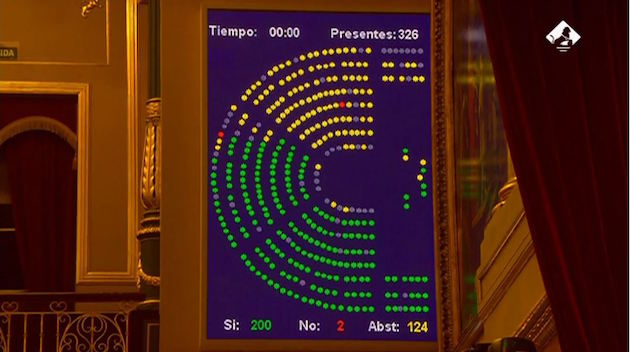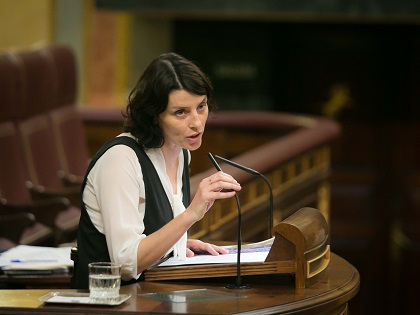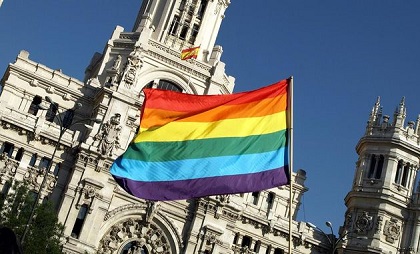The majority of the political parties voted in favour of the Bill that could endanger religious freedom. The ruling Conservatives (PP) confirmed their abstention.
 The start of the process for the LGBT Bill was passed by the majority of the parliament. / Congreso DIputados España
The start of the process for the LGBT Bill was passed by the majority of the parliament. / Congreso DIputados España
The LGBT Equality Bill advances in its parliamentary process after the first debate, which took place in the Spanish Parliament this Tuesday.
Leftist party Unidos Podemos and its confederate parliamentary group, as well as the Catalonian leftist party ERC, Social Democrat party PSOE and Liberal party Ciudadanos, announced that they will voted in favor of the parliamentary process of the proposed law.
The Conservative Popular Party confirmed its abstention, stating that it will present amendments to the whole Bill, writing a new text that addresses all types of discrimination.
Members of the Spanish Federation of Lesbians, Gays, Transsexuals and Bisexuals (FELGTB in Spanish), were present in tha debate, along with other LGBT groups.
Christians have expressed their opposition to a law that could heavily restrict freedom of speech and religious freedom.
“A DEBATE ABOUT FREEDOM OF SPEECH”
The text was defended by Mar García Puig (Podemos), who defined the law as "ambitious" and with "an international reach" because of its relevance.
 Podemos spokesperson María Mar García defends the LGBT law in the Spanish parliament. / Congreso Diputados
Podemos spokesperson María Mar García defends the LGBT law in the Spanish parliament. / Congreso Diputados"The law recognises that we are facing a structural problem. LGBT-phobia is present in the whole system", she denounced.
However, "if the law is accepted, we will have to keep working. There is no doubt that the debate about freedom of speech will take place", she admitted.
PSOE: “THE BILL REQUIRES IMPROVEMENTS”
After this introduction, other political parties presented their positions.
The most enthusiastic spokesperson was Teresa Jordà (ERC). The MP reminded the parliament that her party had already promoted a similar law in Catalonia three years ago.
“‘LGBT-phobia’ is deeply rooted in our society and we have to fight it by all possible means", she said.
Although PSOE also showed its support for the processing of the Bill, its spokesperson, Maria Dolores Galovart, pointed out that "this Bill requires technical and legal improvements, and this will be our contribution.” She wen so far to say that the law will be a "salvation table for many trans boys and girls". But she also said: “We will make the necessary amendments to make the text more coherent and more lawful".
CIUDADANOS: “IT WOULD BRING SERIOUS LEGAL UNCERTAINTY”
Ciudadanos explained that they will vote in favor of the initiative to continue its parliamentary process, because it is a "necessary" law, but denounced the "partisan use" of the LGBT cause by leftists Podemos.
"This law could have been formulated differently", said spokewoman Irene Rivera. She also warned that the law "would bring serious legal uncertainty" as it is presented, and committed to submit amendments in the process of developing the law.
PNV: “WE DO NOT LIKE THE IDEA OF A STATE AGENCY”
The Basque National Party (PNV) spokesman, Aguirretxea Uresti, explained that his group also supports the need for such law, but "the way things are done matters".
"We do not like the idea of the state agency", he said, referring to the law's intention to create an agency which could persecute and punish media, companies and workers who do not promote gender ideology.
PP: ‘IT IS INADMISSIBLE THAT THE PARENTS CANNOT DECIDE’
"The Bill aims to guarantee real equality, so that our country can live in freedom, which is praiseworthy”, Marta González Vázquez, the PP spokeswoman, said.
But "the text is clumsy in form and substance, and against the law in some aspects". A “sloppy” document, she added.
She referred to the creation of the State Agency as a mistake and considered "dangerous" the "tremendous punitive power" that the proposed law wants to give to this agency.
The MP specially emphasised the right of parents to decide about the surgical sexual reassignment or the taking of hormones of their children.
"It is inadmissible that these decisions could be made without the consent of the parents", González denounced.
“THE OVERPROTECTION OF A FEW RESTRICTS FREEDOM OF SPEEECH”
Carlos Salvador Armendari, deputy of the region of Navarra for the Coalition of minority parties, denounced the Bill as an imposition.
"Gender ideology is a kind of secular religion. The Bill wants to impose it as a model of education, without respecting the right of parents to educate their children."
"The overprotection of a few restricts freedom of speech. The law will benefit a private lobby", he concluded.
 A gay flag in a gay pride celebrations in Madrid.
A gay flag in a gay pride celebrations in Madrid.
CHRISTIANS OPPOSE THE CONTROVERSIAL LAW
Evangelical Christians in Spain, as well as Catholics and othr groups, have denounced the Bill because it could strongly restrict freedom of speech and religious freedom.
The Spanish Evangelical Alliance has expressed its concern about the proposed law in a long analysis of the text. The organisation also collected 10,000 signatures to stop the law.
Several international organisations warned against the law, through letters to the government, or documents that analyse the content of it.
The Ibero-American Congress for Life and Family letter claims that “we are all equal under the law (...) Why, then, are the rights of a minority emphasised over all other social groups? Why does that minority have greater benefits than the rest?
Meanwhile, ADF International has issued a document which states that the law is the ‘most harmful in the EU so far’, adding that “we strongly encourage the Spanish Parliament to reject the Bill”.
The Director of European Dignity Watch, Roxana Stanciu, also published an article critising the law.

Las opiniones vertidas por nuestros colaboradores se realizan a nivel personal, pudiendo coincidir o no con la postura de la dirección de Protestante Digital.
Si quieres comentar o